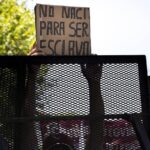
2024 will mark the end of a cycle in which the space to the left of the PSOE has experienced its internal revolution, one more since Podemos burst onto the political scene a decade ago. In the period from the 2019 general elections to the European elections that will be held next summer, a multitude of things have happened: the alternative left entered the Government for the first time at the hands of the party then led by Pablo Iglesias, that formation faced a change of leadership and handed over the baton of political space to Yolanda Díaz while her hegemony faded. And now Sumar, again from the Government, begins to be structured as a new state force that aspires to represent that electoral segment, while Podemos begins a new stage after moving to the Mixed Group.
The European elections mark the border between the ending cycle and the new period. In these months, the different political forces begin assembly processes either of founding, of renewal of leadership or of reaffirmation of their positions. Sumar himself has just held his founding assembly, while Izquierda Unida will address the process to replace Alberto Garzón at the head of the party in May. The two Compromís parties are also holding congresses this year, and Podemos, which does not have a citizen assembly in sight, is coming from a political conference and has just renewed the leadership in almost all of its territories.
All of these appointments will take place before or after several elections that have already begun to mark the pace of decisions in the different organizations. The first, just a few months ago in Galicia, where the non-nationalist left suffered a severe blow. The PSOE remained relegated to third force and neither Sumar nor Podemos managed to enter parliament. The second, in Euskadi, on April 21. There the polls show an uncertain scenario regarding the strength of the nationalist left. There are also Catalan elections on May 12, which could lead Catalunya en Comú to enter the Government for the first time as a minority partner in a coalition with other left-wing forces. And the European elections, which in addition to emerging as an internal plebiscite between the party of Yolanda Díaz and that of Ione Belarra, will also measure how the group of left-wing voters, including those of the PSOE, respond after the first months of the Government.
summer
Sumar has just held its founding assembly, the first step in a long process for the construction of a broad front in which they aspire to bring together different formations: Izquierda Unida, los comuns, Más Madrid, Verdes Equo. Last Saturday, Yolanda Díaz’s platform took the first step in a congress in which those registered endorsed the second vice president as general coordinator and approved the organizational document that establishes the first rules for the construction of that project.
Yolanda Díaz launched Sumar two years ago with the aim of uniting the forces of the alternative left under the same acronym, but the slowness in putting together that project and the electoral call had only allowed until now the formation of an electoral coalition, which worked for on 23J and who suffered his first loss with Podemos.
In these months, the people who are in charge of the political project have taken steps to transcend the coalition but at the same time continue to count on the parties that make it up. The ambition is complex because not only are there political formations and their own militancy, there are also state parties and other clearly regional formations that demand full autonomy in their territories such as Catalunya en Comú or Más Madrid.
All of these unknowns, or at least most of them, will be resolved in a new negotiation between Sumar and the parties that begins now and will conclude with a second congress in the fall. They call that assembly a constituent assembly and there the rules of that broad front will be defined if it is finally built. Everything happens in the middle of a process in which Sumar has to continue functioning as an electoral coalition in Euskadi, Catalunya (where the brand will continue to be Catalunya en Comú) and in the European elections.
United Left
One of the main pieces that Yolanda Díaz has for the construction of Sumar is Izquierda Unida, which also faces a process of introspection with the assembly that will decide who inherits the leadership of Alberto Garzón, who abandoned politics two months ago after eight years at the head of the party.
IU faces its 13th assembly surely in one of its best moments in recent years, with five deputies in Congress, with a Ministry in the Government – that of Children and Youth headed by Sira Rego – and with an important role within of Sumar: it is the only state organization within the project and together with Catalunya en Comú (and the deputies of Movimiento Sumar) the organization with the most weight in the parliamentary group.
The Izquierda Unida assembly, as decided by its last federal coordinator, will be held on May 18 and 19, although the debate process has already begun. The organization’s management agreed in recent months to begin a transition process to try to agree on a unity candidacy. These meetings took place normally until this month when the Minister of Youth and Children, Sira Rego, announced her candidacy to lead IU caused a huge internal stir.
A sector of the party linked to the Communist Party of Spain (PCE) and the Andalusian federation, the largest, accused the minister of trying with her announcement to influence the primaries that were held that week to choose the candidate who will go on the list. to add to the European ones. The anger of that sector motivated Antonio Maíllo to announce days later that he will try to pilot a unity candidacy that he does not rule out leading.
The negotiations for this unitary candidacy continue and the organization has given itself until April 15 to negotiate it. If there is no agreement, two lists could come to the assembly vote. This scenario would leave an image of division that a priori everyone wanted to avoid after Garzón’s departure.
We can
Podemos does not plan to hold a citizen assembly as such this year, at least until the electoral cycle with the European elections ends. But it has initiated a series of processes to change its political roadmap, to modify its executive and also to promote new territorial directions.
In November, the party leadership promoted a political conference, with an agenda of meetings and meetings with the militancy and the different territories to change the political course set in the Fourth Citizen Assembly, which elected Ione Belarra as general secretary, with the in order to disassociate the party’s decisions from Yolanda Díaz’s leadership, once the break with her political project has been confirmed.
Militancy supported the new political document that set new conditions for electoral coalitions and reinforced the “political autonomy” of the party. Shortly after, that will translated into the break with Sumar in the parliamentary group and, although not directly, into the decision to run alone in the Galician elections.
The management recently renewed its executive. After the departure of several key members of the secretariat, such as Nacho Álvarez, head of Economy, or Alejandra Jacinto, who left the party in the summer, Ione Belarra renewed her cabinet to bring in profiles such as Tito Morano, Conchi Abellán, Martina Velarde or Irene de Miguel.
In parallel, Podemos activated a primary process to renew leadership in all territories where mandates expired or where management had to create managers due to resignations or internal crises over recent years, such as in the Balearic Islands, where the leadership resigned. executive en bloc after the results of the regional and municipal elections or in Asturias, where the candidate for the Principality and deputy in parliament, Covadonga Tomé, was recently expelled.
In total, those registered have been able to vote for the new addresses in Asturias, Aragon, the Canary Islands, Catalonia, the Community of Madrid, the Valencian Community, the Balearic Islands and the Region of Murcia. In all of them, the management managed to place candidacies led by state spokespersons and members of Belarra’s hard core, such as Isa Serra in Madrid, Javier Sánchez Serna in Murcia or María Teresa Pérez in Valencia.
commitment
Compromís also sits on the couch in 2024. Specifically, two of the three legs that make up the stable Valencian coalition. Initiative holds its assembly in a few weeks. Last October, the National Initiative-Compromís Table approved the opening of a space for “reflection, debate and growth” to “refound the political space of Valencian ecosocialism”, a process that will culminate in April with the holding of a general assembly. For its part, Més-Compromís, the former Bloc, will also hold a Congress in the fall of this year, specifically on October 18 and 19.
One of the ideas that some leaders within the coalition use is that from both processes a mandate emerges to configure the coalition into a party, with a model similar to that of EH Bildu, to finish consolidating a political platform that transcends the mere electoral coalition. . To do this, Compromís should hold a new constituent or founding congress to inaugurate this new stage, although it is a complex process that would surely last beyond this year.
More Madrid
The organization led by Mónica García held its Congress just a few months ago, precisely when the configuration of the new coalition government in which the Madrid party took over the Ministry of Health was being negotiated. García became head of that portfolio shortly after being elected as the new leader of the party.
García’s candidacy won that congress held at the end of November, with a list that also included Rita Maestre, who headed the list for the Madrid City Council, and the now spokesperson for the formation in the Madrid assembly, Manuela Bergerot, who replaced in the spokesperson Pablo Perpinyá, the person that Íñigo Errejón appointed at the time to run the opposition in Madrid and who is far from the current leadership.
During his speech at that Congress, García made clear the Madrid vocation of his training at a time when he was preparing to make the leap into national politics, as well as his intention for Más Madrid to preserve its autonomy in the new political cycle that It opened at that time, on the eve of Pedro Sánchez’s inauguration and when the party was debating its way of integrating into Sumar. This desire for autonomy has translated into some clashes with Sumar during the negotiations for its fit within the platform, a debate that will surely take several months to resolve.
Catalonia in Common
Last February, the comuns launched an ideological convention to face the new political cycle and with an eye toward the Catalan elections that at that time were scheduled for a year later. The process will continue despite the fact that the president, Pere Aragonès, decided to advance these elections to next May. The internal debate will therefore take place at the gates of an electoral campaign that could end with Jéssica Albiach’s party for the first time in the Government together with the PSC and ERC.
The comuns will celebrate on April 13 the great event that will culminate two months of debates in the local assemblies to which some 12,000 people are called. In the background, in addition to current Catalan politics, there is the relationship between that group and Sumar. The Catalan leg is involved in the process of building the state front and has up to four people in the newly elected executive.
In addition, they have agreed with Yolanda Díaz’s platform to have full autonomy in Catalonia. The comuns will be the Catalan reference for Sumar, which will not deploy an organic structure in that territory.
Source: www.eldiario.es

